Every year, thousands of people end up in the hospital not because of their prescription drugs, but because of what they’re taking on top of them. A daily fish oil capsule. A bottle of St. John’s Wort for mood. A multivitamin with iron. These aren’t drugs. They’re not even labeled as such. But they can still cause dangerous reactions - especially when your doctor doesn’t know about them.
Here’s the hard truth: 78% of Americans take dietary supplements, and only 36% tell their healthcare provider. That’s not just a gap in communication - it’s a safety risk. You might think, “It’s just a vitamin,” or “My doctor never asks,” but the data doesn’t lie. In 2022, the FDA logged over 1,000 adverse events tied to supplements, including 52 deaths. Many of those could’ve been avoided with one simple step: telling your provider exactly what you’re taking.
Why Your Provider Needs to Know About Everything You Take
Over-the-counter (OTC) medicines and dietary supplements don’t go through the same strict approval process as prescription drugs. The FDA doesn’t test them for safety or effectiveness before they hit the shelf. Instead, they’re regulated under the Dietary Supplement Health and Education Act (DSHEA) of 1994, which treats them more like food than medicine. That means manufacturers don’t have to prove their products are safe before selling them. They only have to prove they’re unsafe after people get hurt.
This creates a blind spot. A 2021 study in JAMA Internal Medicine found that 23% of hospital patients had potential drug-supplement interactions, and nearly 8% of those were severe enough to cause organ damage, bleeding, or heart problems. One common example? Taking fish oil with warfarin. Both thin the blood. Together, they can cause uncontrolled bleeding. Another? St. John’s Wort - a popular herbal mood booster - can cut the effectiveness of birth control pills, antidepressants, and even chemotherapy drugs by altering how your liver processes them.
And it’s not just herbs. Even common OTC painkillers like acetaminophen can become dangerous when mixed with certain supplements. In 2022, the FDA cited cases where green tea extract combined with acetaminophen led to acute liver failure. The patient didn’t realize the supplement was the trigger. Their doctor didn’t know they were taking it.
What Exactly Counts as a Supplement (And Why You’re Probably Missing Some)
When people say “supplements,” they usually mean vitamins, fish oil, or herbal teas. But the list is longer - and more confusing - than you think.
- OTC medicines: Pain relievers (ibuprofen, acetaminophen), antacids, sleep aids, allergy pills - these have Drug Facts labels.
- Dietary supplements: Vitamins, minerals, probiotics, collagen, melatonin, creatine, turmeric, ginseng - these have Supplement Facts labels.
- Herbal products: Kava, comfrey, echinacea, licorice root - even if labeled “natural” or “herbal remedy.”
- Functional foods: Protein powders, energy bars with added herbs, fortified waters with added vitamins - if they claim health benefits beyond basic nutrition, they’re often regulated as supplements.
Here’s where most people slip up: 64% of patients don’t consider vitamins or minerals as supplements that need to be reported, according to the American Liver Foundation. But a daily 1,000 mg dose of vitamin D? That’s a pharmacological dose - not just a “multivitamin.” And if you’re on a statin for cholesterol, too much vitamin D can interfere with how your body metabolizes it.
Even more confusing? The labels. Drug Facts (on OTC meds) and Supplement Facts (on vitamins) look similar. But they’re not the same. Drug Facts tell you the active ingredient and its therapeutic dose. Supplement Facts list the amount of the ingredient - but not whether it’s safe at that level. A bottle might say “500mg vitamin C” - but it doesn’t say if that’s too much for you, especially if you’re on kidney medication.
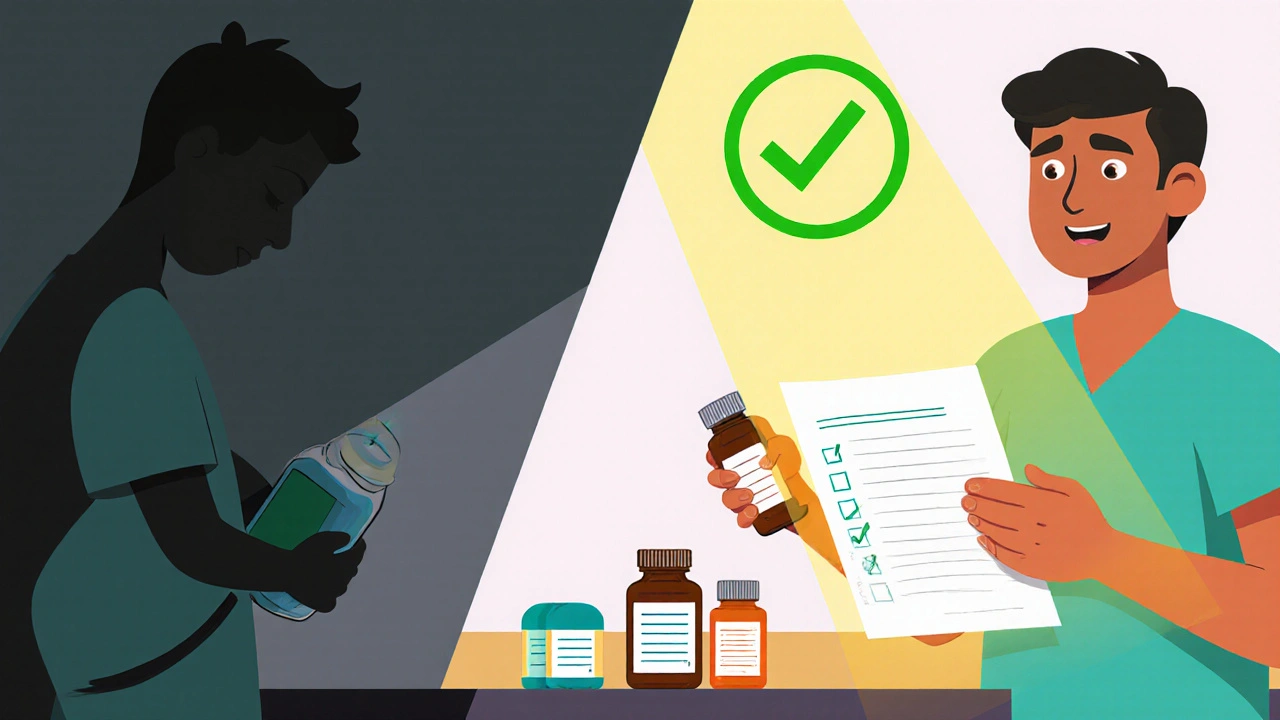
The 4-Step Method to Share Your Use Accurately
Sharing isn’t enough. You need to share accurately. Vague answers like “I take a multivitamin” or “I use some herbs” won’t cut it. Here’s how to do it right.
- Write it all down. Use the NIH ODS “My Dietary Supplement and Medicine Record” form (available online). Don’t rely on memory. List every product you take - even if you only use it once a week.
- Be specific. Don’t write “vitamin B12.” Write “Nature Made B12 1,000 mcg, taken every Monday and Thursday.” Include the brand name, dose, frequency, and why you take it (e.g., “for fatigue,” “doctor recommended,” “for energy”).
- Bring the bottles. Or take a photo of the Supplement Facts or Drug Facts label. Labels change. Brands change. Your provider needs to see what’s actually in the bottle - not what you think is in it.
- Ask the question first. Don’t wait for your provider to ask. Say: “I want to make sure everything I’m taking is safe with my other meds. Here’s what I use.”
A 2020 study across 12 clinics found that patients who used a written list had 64% fewer documentation errors than those who just talked. Written records cut out the guesswork. They also help if you see multiple providers - a pharmacist, a specialist, your GP - everyone gets the same info.
Why Providers Don’t Always Ask (And How to Fix It)
It’s not just you. Many providers don’t ask because they don’t know how - or they assume you’ll tell them. A 2022 study in the Journal of Medical Ethics found that 53% of patients didn’t disclose supplements because their provider never asked. Another 28% thought it wasn’t important. And 19% feared being judged.
But the data shows otherwise. Pharmacists, who are trained in drug interactions, catch 3.2 times more supplement-related risks than physicians during medication reviews. Why? Because they’re trained to ask - and they have tools built into their systems.
Some clinics are fixing this. Mayo Clinic has required supplement screening at every intake since 2020. Epic Systems, the largest electronic health record platform in the U.S., added dedicated supplement fields in 2020 - and is rolling out AI tools in 2024 that automatically flag potential interactions between 14,700 supplements and prescriptions.
Until then, you’re the best safety net. If your provider doesn’t ask, say: “I’ve read that supplements can interact with medications. Can we review what I’m taking?” Most will be grateful you brought it up.
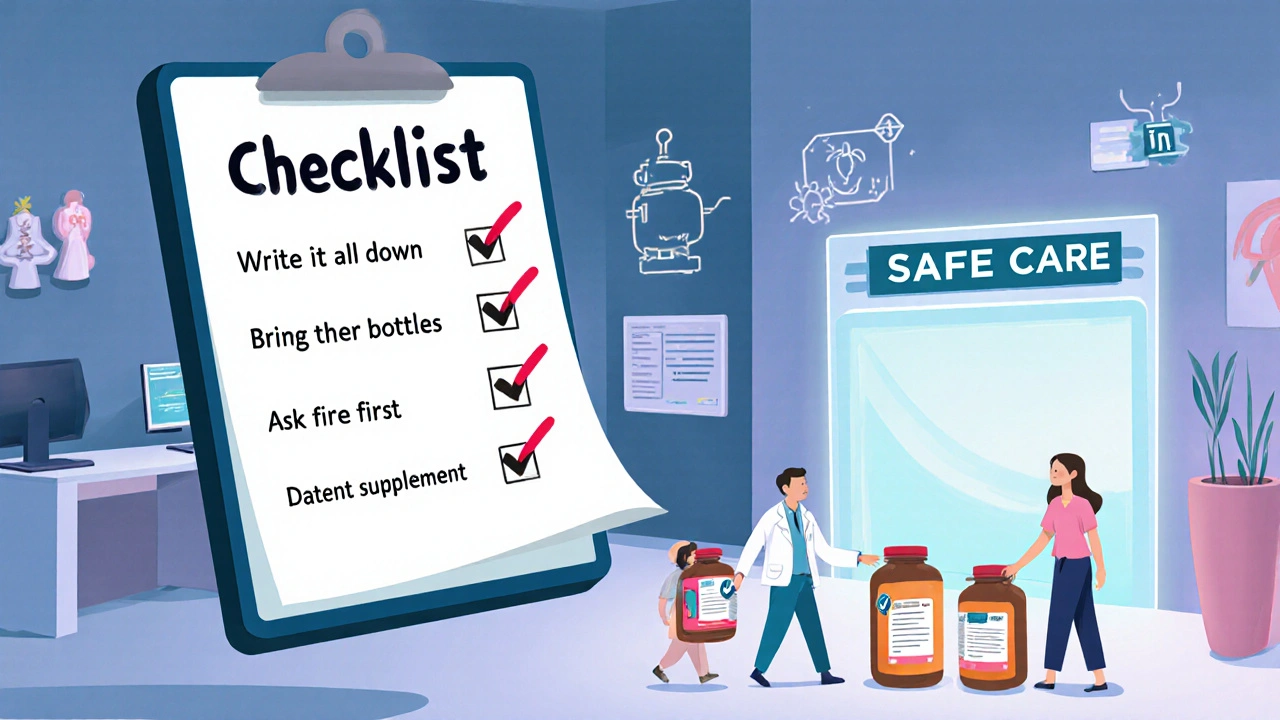
Real Stories: What Happens When You Do - and Don’t - Speak Up
There are two sides to this story.
One: A 68-year-old woman in Texas was on warfarin for a blood clot. She started taking 1,000 mg of fish oil daily for joint pain. She didn’t tell her doctor. One morning, she woke up with bruising all over her arms. Her INR (a blood clotting test) was dangerously high. When her pharmacist reviewed her list - including the fish oil - they adjusted her warfarin dose. She avoided a stroke or internal bleeding.
Two: A 45-year-old woman in California took kava supplements for anxiety. She was also on an antipsychotic. She never mentioned the kava. Six months later, she was rushed to the hospital with acute liver failure. She died. The autopsy revealed the supplement. Her providers had no idea.
These aren’t rare cases. They’re preventable.
What to Do Next: A Simple Action Plan
Here’s your next step - right now.
- Go to the NIH Office of Dietary Supplements website and download the “My Dietary Supplement and Medicine Record” form.
- Open your medicine cabinet. Take out every bottle - OTC pills, vitamins, herbal teas, protein powders, energy gels.
- Write down the exact name, dose, frequency, and reason for each one.
- Take a photo of each label.
- Next time you see your doctor, pharmacist, or nurse - hand them the list. Say: “I want to make sure these are safe with everything else.”
You don’t need to be an expert. You don’t need to understand biochemistry. You just need to be honest and specific. Your provider’s job is to keep you safe - but they can’t do that if they don’t know the full picture.
The supplement market is worth over $57 billion. But safety isn’t about money. It’s about awareness. And awareness starts with you - speaking up, writing it down, and making sure no one misses the details.

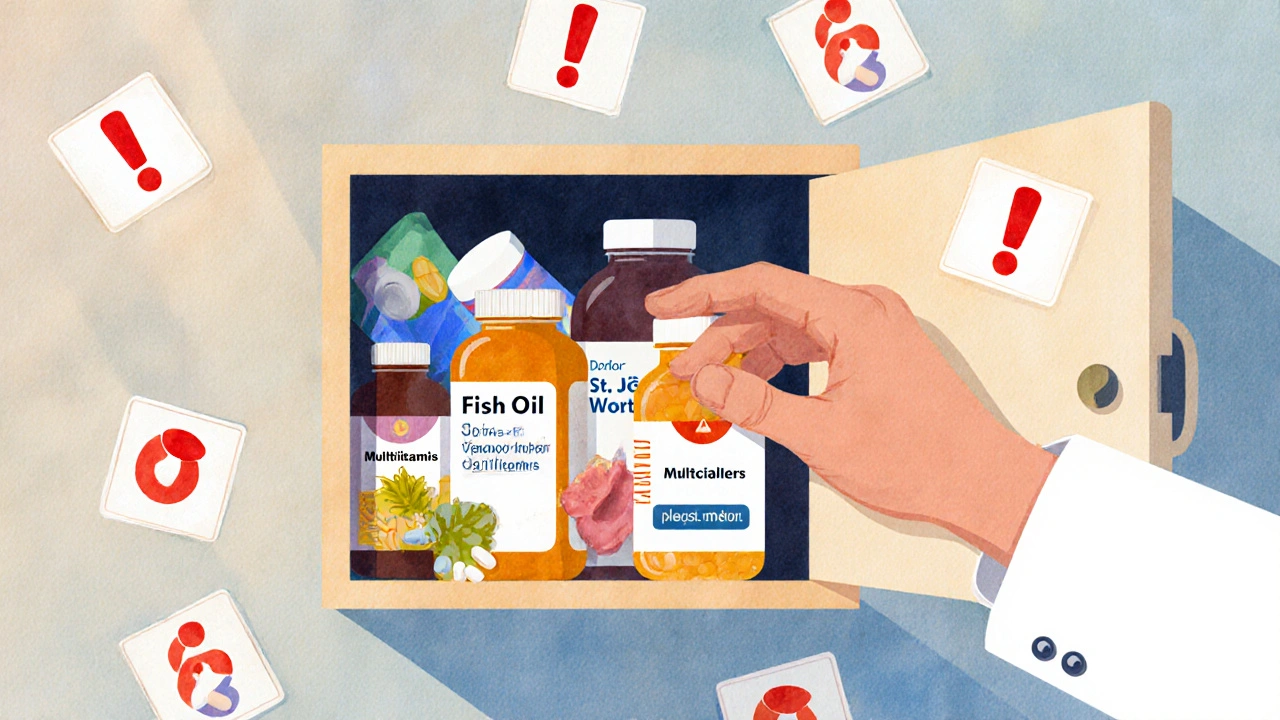

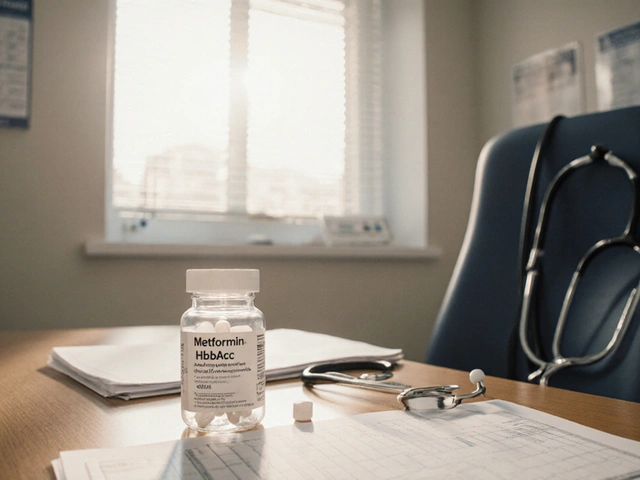
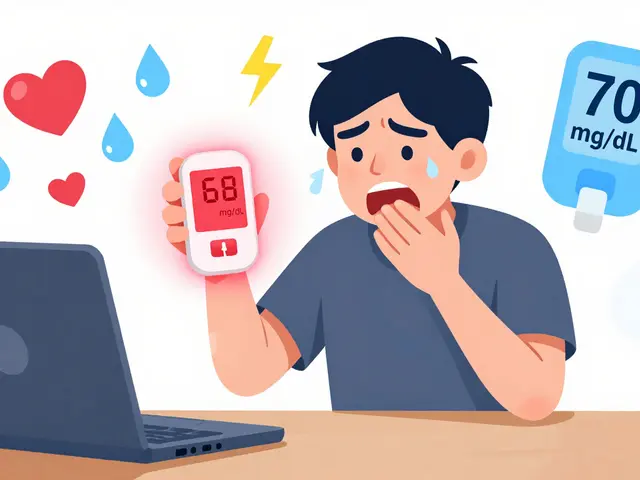
November 14, 2025 AT 18:50 PM
Love this post! I’ve been telling my cousins in India to stop guessing with supplements-they think turmeric is harmless, but one guy ended up with liver issues after mixing it with his blood pressure med. Just write it down, show the bottle, and boom-you’re safer. No drama needed.
November 15, 2025 AT 12:45 PM
As a clinical pharmacist, I see this daily. The real issue isn’t the supplements-it’s the lack of structured documentation in EHRs. Most providers still rely on free-text fields where ‘vitamin D’ gets entered as ‘D3 1000’ or ‘D-3’ or ‘the stuff from GNC.’ AI flags are great, but until we standardize the ontology, we’re just band-aiding the problem.
November 16, 2025 AT 10:04 AM
Oh my god, another ‘just tell your doctor’ post. 🤡 Do you know how many people have zero access to healthcare? Or how many docs spend 7 minutes per visit? You think writing down your supplements fixes systemic neglect? Wake up. This isn’t a personal responsibility issue-it’s a capitalist healthcare failure. Also, St. John’s Wort isn’t ‘natural’-it’s a CYP3A4 inducer. Learn the science before you preach.
November 17, 2025 AT 06:51 AM
OMG I CAN’T BELIEVE PEOPLE DON’T TELL THEIR DOCTORS!!! I took ashwagandha for 3 years and never said a word-until my heart started racing at 3 a.m. and I thought I was dying!! Then I told my doctor and he looked at me like I’d just admitted to summoning demons!! Now I bring EVERY bottle-EVERY SINGLE ONE!! Even the gummy vitamins!! I even took a pic of my probiotic and showed it to my dentist!!
November 17, 2025 AT 16:55 PM
This is so good. I used to think ‘it’s just a vitamin’ until my mom had a bad reaction to vitamin K with her blood thinner. Now I keep a little notebook in my purse and show it to every provider. No shame. No judgment. Just safety. Seriously, just do it. It takes 5 minutes.
November 18, 2025 AT 17:37 PM
It is an incontrovertible fact that the contemporary American healthcare paradigm exhibits a profound epistemological deficit with regard to nutraceuticals, thereby precipitating a cascade of preventable iatrogenic events. The DSHEA of 1994, a legislative relic of deregulatory zealotry, has engendered a regulatory vacuum wherein unvetted bioactive compounds-often of dubious provenance-are ingested with the same impunity as breakfast cereal. One is compelled to observe that the average patient lacks the requisite pharmacological literacy to discern between a pharmacological agent and a dietary adjunct. This is not negligence-it is cultural catastrophe.
November 18, 2025 AT 19:31 PM
Y’all are overthinking this. I just take a pic of everything in my cabinet every year and send it to my doctor. Done. No stress. I even screenshot the Amazon listing if it’s a weird brand. Works every time. 👍
November 19, 2025 AT 18:21 PM
Wait-so you’re telling me that if I take a magnesium supplement, and I’m on a beta-blocker, and I don’t tell my doctor, I could end up with arrhythmia?!! And I thought it was just for cramps?!?! And what about the iron in my multivitamin if I’m on levothyroxine?!?! I’ve been taking that for TEN YEARS and never thought to ask?!?! I’m literally going to the pharmacy right now to take pictures of everything-I’m so mad at myself right now!!
November 21, 2025 AT 03:59 AM
People who don’t disclose supplements are either reckless or ignorant. This isn’t ‘sharing’-it’s basic medical hygiene. If you’re taking anything that affects liver enzymes, you’re playing Russian roulette. And no, ‘natural’ doesn’t mean safe. If you don’t know the CYP450 pathways, you shouldn’t be self-prescribing. You’re not a wellness influencer-you’re a patient. Act like it.
November 22, 2025 AT 13:30 PM
I get that this is important, but I’ve been trying to bring this up with my doctor for months and they just say, ‘We’ll get to it.’ Then they move on to my knee pain. I don’t want to seem like a nuisance, but I’m terrified I’m going to end up in the ER because no one asked. Is there a script I can use? Something that doesn’t make me sound paranoid?